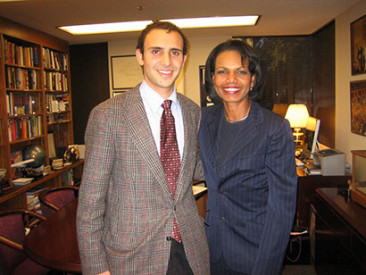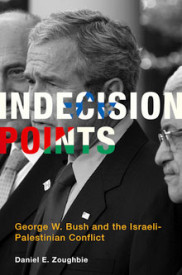Berkeley postdoc and wunderkind probes Bush’s ‘Indecision Points’
For his recently published book, Indecision Points: George W. Bush and the Israeli-Palestinian Conflict, Berkeley postdoc and wunderkind Daniel Zoughbie interviewed more than three dozen world leaders including Condoleezza Rice, former Archbishop of Canterbury Rowan Williams and United Nations secretary general Kofi Annan.

April 7, 2015

Daniel Zoughbie met with former Secretary of State Condoleezza Rice and other world leaders for his book “Indecision Points.” (Courtesy of Daniel Zoughbie)
Daniel Zoughbie was still in his 20s when he spoke with former Secretary of State Condoleezza Rice about the Israeli-Palestinian peace process, and with former House Majority Leader Tom DeLay about the “end-of-days” theology that guided the Republican congressman’s foreign policy.
On a less serious note, he chatted about The Simpsons with Rowan Williams, then the archbishop of Canterbury, and with former United Nations secretary general Kofi Annan about the time he was mistaken for actor Morgan Freeman while visiting a small village in the mountains of Italy.
That’s just a sampling of the 45 world leaders the tenacious Zoughbie, most recently a postdoctoral fellow and lecturer at UC Berkeley’s Center for Middle Eastern Studies, interviewed for Indecision Points: George W. Bush and the Israeli-Palestinian Conflict.
Published in December by MIT Press, the book began as his doctoral thesis in international relations when he was a Marshall scholar and Weidenfeld scholar at the University of Oxford in England. It shines a spotlight on the unprecedented series of “erratic shifts” that American foreign policy in the Middle East underwent during George W. Bush’s presidency.
Specifically, he says, he was researching a failed foreign policy that radically worsened conditions in the Middle East, and so he was compelled to try to understand what went wrong.
“I felt I had a responsibility to make sense of what these leaders were saying to me and how it all fit together,” he says. “I was writing something that hadn’t yet been written.”
At 30, Zoughbie, (pronounced “Zoogbee”) has been something of a wunderkind since graduating from UC Berkeley in urban studies and Middle Eastern studies in 2006. In addition to being a Marshall scholar, Strauss scholar, Haas scholar and Weidenfeld scholar, he has held fellowships and visiting scholar positions at the Harvard Kennedy School, Stanford University’s Center on Democracy, Development and the Rule of Law and Georgetown University’s Berkley Center for Religion, Peace and World Affairs.
Overall, he says, the book project “felt like I was being inserted into some kind of Shakespearean drama,” adding that personal relationships, deception, backstabbing, sooth-saying and hyper-focused devotion to one’s own ideals for world order played major roles in that drama.
“Bush administration policies were equally a tragedy for the people of the region and for American interests in the Middle East,” he says. But the book is also about hope and healing.
“There’s an old Arab proverb I like to quote: ‘When there’s health, there’s hope. And when there’s hope, there’s everything’,” he says.
Which brings us to perhaps his proudest achievement so far, Microclinic International, a global public health nonprofit that seeks to revolutionize how deadly chronic diseases like diabetes are treated and managed.
Zoughbie was just 4 when he visited his diabetic Palestinian grandmother in Bethlehem. Though she died a few years later, that visit, and the impact of diabetes on her and other residents of that region, made a huge impression on him. To honor his grandmother’s memory and “light a candle in the Middle East,” he founded Microclinic International in 2005.
Microclinic only works with teams of people who know and influence each other, such as groups of friends or relatives. The organization’s instructors teach healthy behaviors, such as how to prevent or avoid diabetes, and how to teach others what they have learned. Microclinic calls this process “contagious health.”
So far, the organization has helped more than 1 million people, from the West Bank, Egypt, Qatar, Kenya and India to Mexico and the Appalachian region of Kentucky.
“I see our model as helping to repair the broken fabric of society,” says Zoughbie. “Groups of people helping each other to get healthier is a first step for broken communities to rebuild a future.”
As for his book, his hope is that people around the world, and particularly in the United States and the Middle East, heed philosopher George Santayana’s advice.
“My hope is that a new generation in the Middle East can live in peace, on both sides,” says Zoughbie. “And let’s not forget that those who cannot forget history are also doomed to repeat it. Part of learning from the past is learning to look toward the future and learning to forgive.”
